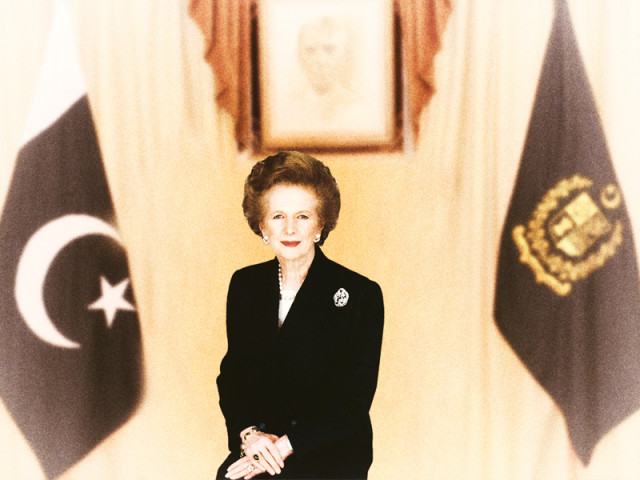An Iron Lady for Pakistan: What would Thatcher do as prime minister?
The country needs nothing short of a complete economic restructuring.

In her first speech at the house of elected representatives, Thatcher will announce the immediate privatisation of many state-owned enterprises like Pakistan Steel Mills, PIA and PSO. CREATIVE COMMONS
It is June 2013. Pakistan has survived five years of economic recession, the worst power breakdowns, two disastrous floods, bloody violence and deepening ethnic polarisation.
After a successful democratic transition in Islamabad, a newly-elected government has just been sworn in under the leadership of Margaret Thatcher and she has vowed to take the country on the path of economic recovery and growth.
In her first speech at the house of elected representatives, Thatcher will announce the immediate privatisation of many state-owned enterprises like Pakistan Steel Mills, Pakistan International Airlines and Pakistan State Oil. She will sell these enterprises after a global tendering process, regardless of the nationality of the bidders.
Showing her staunch resolve to save hard-earned taxpayer money from going to waste on paying salaries of an inefficient workforce, she will not care much about the valuation debate, which back in 2006 had undone the entire privatisation agenda in the case of Pakistan Steel Mills.
That step alone will save the federal government half a trillion rupees, which will be spent on direct and targeted aid to the poor and improving infrastructure, including the railways.
In the same speech, Thatcher will also announce the privatisation of all power distribution companies and declared the creation of an energy market with multiple buyers and sellers. She will dissolve the National Transmission and Dispatch Company and the Pakistan Electric Power Company with immediate effect, thus decentralising energy procurement and distribution.
Thatcher will also promise stronger defence of the country, but will count a stronger economy as a prerequisite. She will increase the defence budget and immediately order the purchase of reconnaissance aircraft for Pakistan Navy, which were shamelessly lost without resistance to terrorists a few years ago.
At the same time, Thatcher will withdraw any concessions provided to army-run commercial enterprises like the National Logistics Company. She will say, “War is too serious a business to be left to generals.”
Thatcher will be equally harsh on lawless labour unions and rent-seeking commercial enterprises. In her first speech, she will not only declare curtailment of the powers of the unions but will also announce withdrawal of all kinds of quotas, SROs and protective measures taken for large local industrialists. She will earn the scorn of both politicised workers and wealthy elite but will grow a thick skin towards them.
Caring about children’s education, and not so much about job creation for teachers, Thatcher will announce and successfully convince provinces to reallocate the hefty education budget from sustaining a large bureaucracy to empowering the poor families through vouchers. The poor will thus choose a private school and ensure reliable education for their children.
Thatcher will announce withdrawal of all kinds of support prices for agriculture output. She will disassociate the government from procurement of commodities and will trust the market, including the infamous middleman, to deliver.
In her speech, she will also announce dissolution of the Pakistan Agriculture Storage and Supplies Corporation and the Trading Corporation of Pakistan.
Turning away from the decades-old industrial policy, Thatcher will announce an immediate dissolution of the Engineering Development Board. She will say, “competitiveness will come from open competition, not through more protection.”
She will end the monopoly of the Japanese car market in Pakistan and will withdraw heavy tariffs on automobiles. She will celebrate the globalising products made in Sialkot and will denounce state-fed industrialists from Faisalabad.
Thatcher will announce the formation of a special committee to deliberate on the dissolution of the Planning Commission, the Ministry of Commerce and the Ministry of Industries and Special Production.
Thatcher will turn the strategic depth argument on its head by opening and expanding trade with Afghanistan and will welcome Afghans as investors in Pakistan. She will build a business partnership on ethnic relationships instead of war-mongering.
She will announce her first foreign trip to be made to Afghanistan to lay grounds of an economic foreign policy. In her trip, she will be accompanied by businessmen, not generals. In the same trip, she will also reach an agreement with Kabul to stop supporting terrorists on each others’ grounds.
In her first speech, the Iron Lady will declare a complete roadmap to Pakistan’s prosperity.
Flash backwards. It is April 2013. Elections have been announced and candidates have been declared. Although we do not see any iron lady in top leaders here, there should not be any doubt that we need the same level of conviction, clarity of thinking and hardheadedness amongst the men and women on the top. We want nothing short of a complete economic restructuring; and as our history tells us, we have limited choice in terms of choosing leaders for this purpose.
The writer heads PRIME, a free market economy think-tank based in Islamabad
Published in The Express Tribune, April 15th, 2013.
Like Business on Facebook to stay informed and join in the conversation.



















COMMENTS
Comments are moderated and generally will be posted if they are on-topic and not abusive.
For more information, please see our Comments FAQ